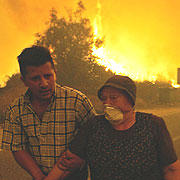Once you dismiss real knowledge as the goal of education, you have to find something else to do. That’s why the Anything But Knowledge doctrine leads directly to Professor Nelson’s odd course. In thousands of education schools across the country, teachers are generating little moments of meaning, which they then subject to instant replay. Educators call this "constructing knowledge," a fatuous label for something that is neither construction nor knowledge but mere game-playing. Teacher educators, though, possess a primitive relationship to words. They believe that if they just label something "critical thinking" or "community-building," these activities will magically occur.
For all the ed school talk of freedom from the past, teacher education in this century has been more unchanging than Miss Havisham. Like aging vestal virgins, today’s schools lovingly guard the ancient flame of progressivism. Since the 1920s they have not had a single new idea; they have merely gussied up old concepts in new rhetoric, most recently in the jargon of minority empowerment. To enter an education classroom, therefore, is to witness a timeless ritual, embedded in an authority structure of unions and state education departments as rigid as the Vatican.
It is a didactic ritual as well. The education professor’s credo is: As I do unto you, so shall you do unto your students. The education professor "models" how she wants her students to teach by her own classroom methods. Such a practice is based on a glaring fallacy—that methods that work passably well with committed 22-year-olds, paying $1,800 a course for your wisdom, will translate seamlessly to a class of seven-or twelve-year-olds.
The Anything But Knowledge credo leaves education professors and their acolytes free to concentrate on far more pressing matters than how to teach the facts of history or the rules of sentence construction. "Community-building" is one of their most urgent concerns. Teacher educators conceive of their classes as sites of profound political engagement, out of which the new egalitarian order will emerge. A case in point is Columbia’s required class, "Teaching English in Diverse Social and Cultural Contexts," taught by Professor Barbara Tenney (a pseudonym). "I want to work at a very conscious level with you to build community in this class," Tenney tells her attentive students on the first day of the semester this spring. "You can do it consciously, and you ought to do it in your own classes." Community-building starts by making nameplates for our desks. Then we all find a partner to interview about each other’s "identity." Over the course of the semester, each student will conduct two more "identity" interviews with different partners. After the interview, the inevitable self-reflexive moment arrives, when Tenney asks: "How did it work?" This is a sign that we are on our way to "constructing knowledge."
A hallmark of community-building is its overheated rhetoric. The education professor acts as if she were facing a pack of snarling Serbs and Croats, rather than a bunch of well-mannered young ladies (the vast majority of education students), hoping for a good grade. So the community-building assignments attack nonexistent problems of conflict. Tenney, sporting a black leather miniskirt and a cascade of blonde curls, hands out a sheet of paper and asks us to respond to the questions: "What climate would allow you to do your best work? How should a class act to encourage open and honest and critical dialogue?" We write for a while, then read our response to our interview partner.
Now is this question really necessary, especially for a group of college graduates? Good classroom etiquette is hardly a mystery. In the evil traditional classroom, and probably also at Teachers College, if a student calls another a fathead, thus discouraging "open and honest and critical dialogue," the teacher would simply reprimand him, and everyone would understand perfectly well what just happened and why. Consensus already exists on civil behavior. But the education classroom, lacking a pressing agenda in concrete knowledge, has to "problematize" the most automatic social routines.
Of course, no amount of writing about the conditions for "open dialogue" can change the fact that discussion is not open on many issues at Teachers College and other progressive bastions. "If you don’t demonstrate the correct point of view," says a student, "people are hostile. There’s a herd mentality here." A former student of Tenney’s describes the difficulties of dissent from the party line on racism: "There’s nothing to be gained from challenging it. If you deny that the system inherently privileges whites, you’re ‘not taking responsibility for your position in racism.’ " Doubtless, it would never occur to Professor Tenney that the problem this student describes impedes community-building.
All this artificial "community-building," however gratifying to the professors, has nothing to do with learning. Learning is ultimately a solitary activity: we have only one brain, and at some point we must exercise it in private. One could learn an immense amount about Schubert’s lieder or calculus without ever knowing the name of one’s seatmate. Such a view is heresy to the education establishment, determined, as Rita Kramer has noted, to eradicate any opportunity for individual accomplishment, with its sinister risk of superior achievement. For the educrats, the group is the irreducible unit of learning. Fueling this principle is the gap in achievement between whites and Asians, on the one hand, and other minorities on the other. Unwilling to adopt the discipline and teaching practices that would help reduce that gap, the education establishment tries to conceal it under group projects.
And so the ultimate community-building mechanism is the ubiquitous "collaborative group." No activity is too solitary to escape assignment to a group: writing, reading, researching, thinking—all are better done with many partners, according to educational dogma. If you see an ed school class sitting up in straight rows, call a doctor, because it means the professor has had a heart attack and couldn’t arrange the class into groups.
For all their "progressive" sympathies, not all ed students like this regime. "I’m a socialist at heart," says one of Tenney’s students, establishing her bona fides, "but some tasks, like writing, are not collaborative. It’s hard when someone loses their voice." Another Columbia student in the Education Administration program complains that "teachers here let the group projects run wild." At $1,800 a course, it’s frustrating "when the last four sessions of a class are group projects that are all garbage." Lastly, small group discussions have a habit of careening off the assigned topic. The professors rarely intervene, however, says a Teachers
College student, "because they don’t want to interfere with the interaction."
The elevation of the group entails the demotion of teachers—yet another plank in the Anything But Knowledge platform. To accord teachers any superior role in the classroom would be to acknowledge an elite hierarchy of knowledge, possessed by some but not all, at least without effort. Teachers traditionally represent elitism, learning, authority—everything that progressivism scorns—and so they must be relegated to the role of mere facilitators for the all-important group.
Linda Darling-Hammond’s description of collaborative learning perfectly captures how inextricable the political is from the educational in progressive theory. "Whereas traditional classrooms tend to be still but for the sound of teacher talking, learning-centered classrooms feature student talk and collective action." (The "learning-centered classroom" is Darling-Hammond’s jargon for a student-centered classroom.) "Collective action"—how exciting! But though lots of undirected "student talk" hardly seems conducive to learning, progressives abhor quiet. David Schaafsma, one of Columbia’s more politicized teachers, told his English Methods class of visiting a quiet third-grade class in the Bronx; explaining: "It terrifies me when kids are really really still." "They’ve got to move." It never occurs to these apostles of the Free Self that for many inner-city children, reaching a state of calm attention is a wonderful achievement.
Collaborative learning leads naturally to another tic of the progressive classroom: "brainstorming." Rather than lecture to a class, the teacher asks the class its opinion about something and lists the responses on the blackboard. Nothing much happens after that; brainstorming, like various forms of community-building, appears to be an end in itself. Hunter College professor Faith DiCaprio (a pseudonym) recently used two levels of brainstorming—whole group and small group—with her "Language and Literacy in Early Childhood" class. The class had just read Wally’s Stories by Vivian Paley, essentially a transcript of freewheeling discussions among kindergartners in a progressive classroom. First, DiCaprio asked her students what they liked about the book. As students called out their responses—"I liked how she didn’t correct the students," "She reminded us why a child-centered room is so necessary: she didn’t intrude on their conversation"—DiCaprio writes their responses in abbreviated ed-speak on big posted sheets of paper: "Tolerance: they negotiated meaning" and "Created safe arena."
After DiCaprio fills up the posted pages, nothing happens. Nothing needs to happen, for the lists of responses are visible proof of how much the class already knows. We have just "constructed knowledge." On to the next brainstorming exercise. This time, it’s a twofer—brainstorming plus collaborative learning. DiCaprio breaks the class into small groups. Their assignment: list and categorize the topics discussed by the kindergartners in Wally’s Stories. So the students dutifully make lists of fairies, food, plants, witches, and other meaty matters. One outspoken girl enthuses to her group: "And the kids were smart, they were like, ‘The turnips push up with the roots,’ and I was like, ‘How’d they know that?’ " After the groups complete their lists, they read them to the rest of the class. Learning tally? Almost zero.
The consequences of the Anything But Knowledge credo for intellectual standards have been dire. Education professors are remarkably casual when it comes to determining whether their students actually know anything, rarely asking them, for example, what can you tell us about the American Revolution? The ed schools incorrectly presume that the students will have learned everything they need to know in their other or previous college courses, and that the teacher certification exams will screen out people who didn’t.
Even if college education were reliably rigorous and comprehensive, education majors aren’t the students most likely to profit from it. Nationally, undergraduate education majors have lower SAT and ACT scores than students in any other program of study. Only 16 percent of education majors scored in the top quartile of 1992-93 graduates, compared with 33 percent of humanities majors. Education majors were overrepresented in the bottom quartile, at 30 percent. In New York City, many education majors have an uncertain command of English—I saw one education student at City College repeatedly write "choce" for "choice"—and appear altogether ill at ease in a classroom. To presume anything about this population without a rigorous content exit exam is unwarranted.
The laissez-faire attitude toward student knowledge rests on "principled" grounds, as well as on see-no-evil inertia. Many education professors embrace the facile post-structuralist view that knowledge is always political. "An education program can’t have content [knowledge] specifics," explains Migdalia Romero, chair of Hunter College’s Department of Curriculum and Teaching, "because then you have a point of view. Once you define exactly what finite knowledge is, it becomes a perspective." The notion that a culture could possess a pre-political common store of texts and ideas is anathema to the modern academic.
The most powerful dodge regurgitates William Heard Kilpatrick’s classic "critical thinking" scam. Asked whether a future teacher should know the date of the 1812 war, Professor Romero replied: "Teaching and learning is not about dates, facts, and figures, but about developing critical thinking." When pressed if there were not some core facts that a teacher or student should know, she valiantly held her ground. "There are two ways of looking at teaching and learning," she replied. "Either you are imparting knowledge, giving an absolute knowledge base, or teaching and learning is about dialogue, a dialogue that helps to internalize and to raise questions." Though she offered the disclaimer "of course you need both," Romero added that teachers don’t have to know everything, because they can always look things up.
Romero’s tolerance of potential teacher ignorance perfectly reflects New York State’s official policy on learning, a sellout to progressivism in its preference for "concepts" and "critical thinking" over measurable knowledge. The Regents’ much-vaunted 1996 "student learning standards," are vacuous evasions of facts and knowledge, containing not a single book or document or historical fact that students should know. Literature? The word isn’t mentioned. Instead, proclaim the standards in classic educationese, "students will listen, speak, read, and write for literary response and expression"—literally a meaningless statement, matched in its meaninglessness only by the next "English Language Arts" standard: "Students will listen, speak, read, and write for social interaction." Teachers need to get hold of the third level of documentation accompanying the standards to find any specific historical figures or events or books, but there, excessive detail and gaseous generalization will overwhelm them.
But what New York State expects of its students is a model of rigor compared to what it formally expects of its teachers. The State Teacher Certification Exams are a complete abdication of the state’s responsibility for ensuring an educated teaching force. If any teachers in the state know anything about American history, English literature, or chemistry, it is a complete accident, for the state’s highest education authorities have not the slightest interest in finding out. The Liberal Arts and Sciences Test, the ticket to a teacher’s first five years in a classroom, contains absolutely no substance; at most, it tests reading skills. The test preparation booklet is a classic of educationese. The exam section on "Historical and Social Scientific Awareness" (note: not "knowledge"), for example, tests teachers’ "understanding [of] the interrelatedness of historical, geographic, cultural, economic, political and social issues and factors."
Now, by loading on the different types of "issues and factors" that prospective teachers are supposed to understand, the exam ensures that they need know nothing in particular. The only thing that test takers do have to know is the multicultural dogma that there is no history, only "multiple perspectives" on history. The certification exam asks prospective teachers to "analyze multiple perspectives within U.S. society regarding major historical and contemporary issues"—not history, but "historical issues," and not even "historical issues," but "multiple perspectives" on "historical issues." Such a demand is ripe for spouting off, say, on the "Native American perspective" on the Western expansion, without having the slightest idea what fueled that expansion, when and where it occurred, who peopled it, and what its consequences were. In fairness, the Content Specialty Tests teachers must take for permanent certification are much more substantive, especially in science and math, but only one-third of the teachers seeking provisional certification ever make it that far.
The pedagogy portion of the Liberal Arts and Sciences certification exam resembles a catechism more than an exam. "Multiple perspectives" are clearly not acceptable in answering such loaded questions as: "Analyze how classroom environments that respect diversity foster positive student experiences," or, "Analyze how schoolwide structures (i.e., tracking) and classroom factors (e.g., homogeneous versus heterogeneous grouping [presumably by ability], student-teacher interactions) may affect students’ self-concepts and learning." Will a would-be teacher who answers that classrooms should stress a common culture or that ability-grouping promotes excellence remain just a would-be teacher? One hopes not.
The exams echo with characteristic ed school verbiage. The student doesn’t learn, he achieves "learning processes and outcomes"; the teacher doesn’t teach, she "applies strategies for facilitating learning in instructional situations." Disregard for language runs deep in the teacher education profession, so much so that ed school professors tolerate glaring language deficiencies in schoolchildren. Last January, Manhattan’s Park West High School shut down for a day, so that its faculty could bone up on progressive pedagogy. One of the more popular staff development seminars was "Using Journals and Learning Logs." The presenters—two Park West teachers and a representative from the New York City Writing Project, an anti-grammar initiative run by Lehman College’s Education School—proudly passed around their students’ journal writing, including the following representative entry on "Matriarchys v. pratiarchys [sic]": "The different between Matriarchys and patriarchys is that when the mother is in charge of the house. sometime the children do whatever they want. But sometimes the mother can do both roll as a mother and as a father too and they can do it very good." A more personal entry described how the author met her boyfriend: "He said you are so kind I said you noticed and then he hit me on my head. I made-believe I was crying and when he came naire me I slaped him right in his head and than I ran . . . to my grandparients home and he was right behind me. Thats when he asked did I have a boyfriend."
The ubiquitous journal-writing cult holds that such writing should go uncorrected. Fortunately, some Park West teachers bridled at the notion. "At some point, the students go into the job market, and they’re not being judged ‘holistically,’ " protested a black teacher, responding to the invocation of the state’s "holistic" model for grading writing. Another teacher bemoaned the Board of Ed’s failure to provide guidance on teaching grammar. "My kids are graduating without skills," he lamented.
Such views, however, were decidedly in the minority. "Grammar is related to purpose," soothed the Lehman College representative, educrat code for the proposition that asking students to write grammatically on topics they are not personally "invested in" is unrealistic. A Park West presenter burst out with a more direct explanation for his chilling indifference to student incompetence: "I’m not going to spend my life doing error diagnosis! I’m not going to spend my weekend on that!" Correcting papers used to be part of the necessary drudgery of a teacher’s job. No more, with the advent of enlightened views about "self-expression" and "writing with intentionality."
However easygoing the education establishment is regarding future teachers’ knowledge of history, literature, and science, there is one topic that it assiduously monitors: their awareness of racism. To many teacher educators, such an awareness is the most important tool a young teacher can bring to the classroom. It cannot be developed too early. Rosa, a bouncy and enthusiastic junior at Hunter College, has completed only her first semester of education courses, but already she has mastered the most important lesson: America is a racist, imperialist country, most like, say, Nazi Germany. "We are lied to by the very institutions we have come to trust," she recalls from her first-semester reading. "It’s all government that’s inventing these lies, such as Western heritage."
The source of Rosa’s newfound wisdom, Donaldo Macedo’s Literacies of Power: What Americans Are Not Allowed to Know, is an execrable book by any measure. But given its target audience—impressionable education students—it comes close to being a crime. Widely assigned at Hunter, and in use in approximately 150 education schools nationally, it is an illiterate, barbarically ignorant Marxist-inspired screed against America. Macedo opens his first chapter, "Literacy for Stupidification: The Pedagogy of Big Lies," with a quote from Hitler and quickly segues to Ronald Reagan: "While busily calling out slogans from their patriotic vocabulary memory warehouse, these same Americans dutifully vote . . . for Ronald Reagan, giving him a landslide victory . . . . These same voters ascended [sic] to Bush’s morally high-minded call to apply international laws against Saddam Hussein’s tyranny and his invasion of Kuwait." Standing against this wave of ignorance and imperialism is a lone 12-year-old from Boston, whom Macedo celebrates for his courageous refusal to recite the Pledge of Allegiance.
What does any of this have to do with teaching? Everything, it turns out. In the 1960s, educational progressivism took on an explicitly political cast: schools were to fight institutional racism and redistribute power. Today, Columbia’s Teachers College holds workshops on cultural and political "oppression," in which students role-play ways to "usurp the existing power structure," and the New York State Regents happily call teachers the "ultimate change agents." To be a change agent, one must first learn to "critique" the existing social structure. Hence, the assignment of such propaganda as Macedo’s book.
But however bad the influence of Macedo’s puerile politics on future teachers, it pales compared to the model set by his writing style. A typical sentence: "This inability to link the reading of the word with the world, if not combated, will further exacerbate already feeble democratic institutions [sic] and the unjust, asymmetrical power relations that characterize the hypocritical nature of contemporary democracies." Anyone who dares criticize Macedo for his prose is merely trying to "suffocate discourses," he says, with the "blind and facile call for clarity." That Hunter College could assign this gross betrayal of the English language to future teachers is a sufficient reason for closing its education program down. Rosa’s control of English is shaky enough as it is; to fill her ears with such subliterate writing represents professional malpractice.
But Macedo is just one of the political tracts that Hunter force-fed the innocent Rosa in her first semester. She also learned about the evils of traditional children’s stories from education radical Herbert Kohl. In Should We Burn Babar? Kohl weighs the case for and against the dearly beloved children’s classic, Babar the Elephant, noting in passing that it prevented him from "question[ing] the patriarchy earlier." He decides—but let Rosa expound the message of Kohl’s book: "[Babar]’s like a children’s book, right? [But] there’s an underlying meaning about colonialism, about like colonialism, and is it OK, it’s really like it’s OK, but it’s like really offensive to these people." Better burn Babar now!
In New York, as in almost every state, the focus on diversity and anti-racism indoctrination comes with the highest imprimatur. The State Board of Regents requires all prospective teachers to have at least one course in "diversity"; many local ed schools pride themselves on weaving "diversity" into all their courses. The nation’s most influential education school, Teachers College, promotes the most extreme race consciousness in its mandated diversity program. In her large lecture course, Professor Valerie Henning-Piedmont sneered at "liberal correctness," which she defined as "I don’t see the color of my students." Such misguided color blindness, she said, equals: "I don’t see the students."
Expect the folly only to grow worse. A draft report from the Regents Task Force on Teaching, grousing that future teachers lack sufficient grounding in diversity, calls for special training in such challenges as "teaching both sexes," thus further legitimizing the ludicrous proposition that schools mistreat girls. The Regents also make recruiting a more "diverse" teaching force a top priority, based on the assumption that minority students learn best from minority teachers. Currently, 34 percent of teachers in New York City, and 15 percent state-wide, are minorities, compared to a student population that is 83 percent minority in New York City and 43 percent statewide. Asked what evidence the Regents have for the proposition that the color of the teaching force correlates with achievement, Doris T. Garner, staff coordinator for the Task Force, admitted, "I don’t think hard evidence exists that would say that." If black students should be taught by black teachers, should white students be taught by white teachers? "I would not recommend that," replied Garner, fearless of illogic.
Since the Regents are making teacher diversity a top priority, something is going to have to give. Currently, blacks fail the content-free Liberal Arts and Sciences Test of provisional certification at a rate five times that of whites. But that’s just a temporary obstacle, because the test-bias hounds may be already closing in for the kill: the discovery that the exam discriminates against minorities. The Regents’ most recent paper on teacher training warned that the certification exam "must exclude language that would jeopardize candidates, and include language and content that reflects diversity." Now, the only candidates who would be jeopardized by the exam’s language are those, of any color, who are deeply troubled by hot air. As for "cultural bias," at present the exam is a rainbow of multicultural examples and propaganda—one sample question, for example, features a fawning review of a "multicultural dance work that is truly representative of the diversity of New York." Don’t be surprised if the complete absence of any "bias" in the exam, however, fails to prevent a concerted, taxpayer-funded effort to redraft it so as to guarantee an equal pass rate among all groups of takers.
Though the current diversity battle cry is "All students can learn," the educationists continually lower expectations of what they should learn. No longer are students expected to learn all their multiplication tables in the third grade, as has been traditional. But while American educators come up with various theories about fixed cognitive phases to explain why our children should go slow, other nationalities trounce us. Sometimes, we’re trounced in our own backyards, causing cognitive dissonance in local teachers.
A young student at Teachers College named Susan describes incredulously a Korean-run preschool in Queens. To her horror, the school, the Holy Mountain School, violates every progressive tenet: rather than being "student-centered" and allowing each child to do whatever he chooses, the school imposes a curriculum on the children, based on the alphabet. "Each week, the children got a different letter," Susan recalls grimly. Such an approach violates "whole language" doctrine, which holds that students can’t "grasp the [alphabetic] symbols without the whole word or the meaning or any context in their lives," in Susan’s words. Holy Mountain’s further infractions include teaching its wildly international students only in English and failing to provide an "anti-bias multicultural curriculum." The result? By the end of preschool the students learn English and are writing words. Here is true belief in the ability of all children to learn, for it is backed up by action.
Across the city, young teachers are dumping progressive theories faster than Indonesian currency. For all the unctuous talk of diversity, many progressive tenets are dangerously ill adopted to inner-city classrooms. "They don’t say ‘boo’ about this population," scoffs Samantha, a recent Hunter graduate now teaching in Brooklyn’s Bedford-Stuyvesant section. "My course in multiculturalism had zero to do with the classroom."
A former dancer, Samantha was an open receptacle for progressive ideas. But her early efforts to follow the model have left her stranded. Her fourth-grade class is out of control. "I didn’t set it up in a strict manner at the beginning," she laments. "I gave them too many choices; I did a lot of things wrong." Collaborative learning? Forget about it. "My kids resort to fighting immediately if I put them in groups." Samantha tried to use groups to make a poster on electricity. "It was mayhem; they couldn’t stay quiet," she recalls.
The student-centered classroom is equally a fraud. "You can’t give them choices," Samantha asserts flatly. Next year, with a new class, she will do things differently. "I will have everything set up to the last detail—their names on the desks, which notebooks to buy, how to label them. They need to know what hook to hang their coat on and where to go from there. Every minute of the day has to be scripted. You can’t just say: ‘Line up!’ because they’ll fight. Instead, you have to say: ‘Boys, stand up, push in your chairs, and here are your line spots.’ "
As for "meta-cognition," that is out as well. "My kids need the rote; they can’t do half of six or four divided by two." Samantha is using the most unholy of unholies to teach her children to read—a basal reader, derided by the education establishment as spirit-killing. But the reader gives her specific skill sets to work on—above all, phonics and grammar. "My kids don’t hear the correct sound of words at home, such as ‘th’ or the ending of words, so teaching reading is harder."
Journals, whole language, and "portfolio assessment" became more casualties of the real world at the Holy Cross School in the Bronx. The school recently hired a Teachers College graduate who arrived fired up with those student-centered methods. No more. Now she is working very hard on grammar, according to assistant principal William Kurtz. "Those [progressive] tools don’t necessarily work for kids who can’t read or tell you what a noun or a verb is," he says. In his own history class, Kurtz has discovered that he needs to be as explicit about study habits and research methods as Samantha is about classroom behavior. "When I give an essay question, I have to be very structured about going to the library and what resources to use. If you don’t do that, they look up nothing."
The education establishment would be unfazed by these stories. Samantha and William, it would say, are still prisoners of the "deficit model." All these two benighted teachers can see is what their kids don’t know, instead of building on their strengths. If those strengths are hip-hop music, for example, focus on that. But for heaven’s sake, don’t deny the children the benefits of a child-centered classroom.
In fact, the strict environment that Samantha plans is the best thing that could happen to her pupils. It is perhaps the only place they will meet order and civility. Samantha’s children are "surrounded by violence," she says. Many are not interested in learning, because at home, "everyone is dissing everybody, or staying up late to get high. My kids are so emotionally beat up, they don’t even know when they’re out of their seats." A structured classroom is their only hope to learn the rules that the rest of society lives by. To eliminate structure for kids who have none in their lives is to guarantee failure.
Given progressive education’s dismal record, all New Yorkers should tremble at what the Regents have in store for the state. The state’s teacher education establishment, led by Columbia’s Linda Darling-Hammond, has persuaded the Regents to make its monopoly on teacher credentialing total. Starting in 2003, according to a Regents plan steaming inexorably toward adoption, all teacher candidates must pass through an education school to be admitted to a classroom. We know, alas, what will happen to them there.
This power grab will be a disaster for children. By making ed school inescapable, the Regents will drive away every last educated adult who may not be willing to sit still for its foolishness but who could bring to the classroom unusual knowledge or experience. The nation’s elite private schools are full of such people, and parents eagerly proffer tens of thousands of dollars to give their children the benefit of such skill and wisdom.
Amazingly, even the Regents, among the nation’s most addled education bodies, sporadically acknowledge what works in the classroom. A Task Force on Teaching paper cites some of the factors that allow other countries to wallop us routinely in international tests: a high amount of lesson content (in other words, teacher-centered, not student-centered, learning), individual tracking of students, and a coherent curriculum. The state should cling steadfastly to its momentary insight, at odds with its usual policies, and discard its foolhardy plan to enshrine Anything But Knowledge as its sole education dogma. Instead of permanently establishing the teacher education status quo, it should search tirelessly for alternatives and for potential teachers with a firm grasp of subject matter and basic skills. Otherwise ed school claptrap will continue to stunt the intellectual growth of the Empire State’s children.
The end.
+++++++++++++
Para aqueles que não sabem ler em inglês, procurem a versão em portuguesa traduzida pelo Prof. João Carlos Espada (se não estou em erro). Creio que foi publicada num dos cadernos do Jornal Expresso aqui há uns tempos atrás.














